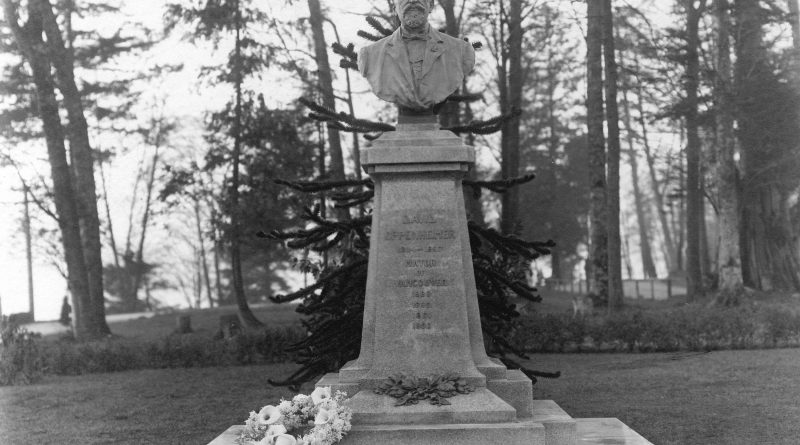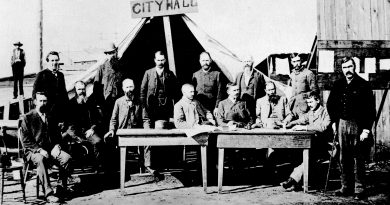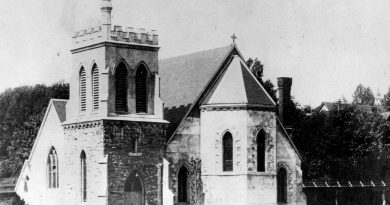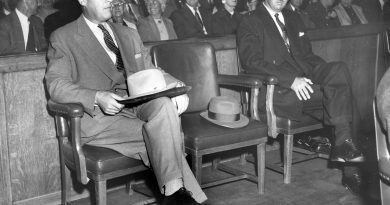David Oppenheimer

mayor of Vancouver without
pay from 1888 to 1891
Vancouver’s oldest company is older than the city itself. The story began in Germany in the last century when four young brothers, Godfrey, Charles, David and Isaac Oppenheimer left their native Frankfurt “to help in building a new continent.” They left in 1848 and settled first in New Orleans. In 1853 they moved to a California just beginning to burn with Gold Rush fever, but by 1857 the fever was beginning to cool, so they looked north.
It happens that the four Oppenheimer brothers had dealt with people in Victoria, which was then almost entirely supplied not over land, but by water from San Francisco. “So it was to this outpost of the British Empire,” says a company history, “that the brothers moved in 1858 and entered the grocery business in that tiny village. (The population then was slightly more than 3,000.) It was a hardy settlement of soldiers, sailors, miners, trappers, businessmen and a mixed group of adventurers and Indians.”
Their timing was excellent: Not long after they arrived in Victoria, gold was discovered in the Cariboo and a stampede of development began. They realized immediately that the company must be moved to the mainland, closer to the thousands of newly arrived gold miners operating along the banks of the Fraser.
They chose Yale, at the head of navigation. Sternwheelers brought supplies from New Westminster and Fort Langley to the Oppenheimer Brothers’ store and warehouse, and from there they went out to all parts of the Cariboo “on a road of sorts that had been hacked out of the wilderness and rock by the Royal Engineers.”
By 1863, with the establishment of a regular freighting service, the importance of Yale had diminished and the Oppenheimers went back to Victoria.
By the early 1880s the Cariboo Gold Rush was over. By then, however, David Oppenheimer, the second-youngest of the brothers, was looking elsewhere. He found out somehow that the Canadian Pacific rail terminus would not be in Port Moody, as was expected, but in the tiny village of Granville (more commonly called Gastown) on Burrard Inlet. He and Isaac, the youngest, moved to Granville. It was 1885.
The firm of Oppenheimer Brothers has been here ever since. By 1886, the year of Vancouver’s incorporation, the company was firmly established. David and Isaac played a part in the incorporation, and they quickly became a force in local politics. Isaac was elected to council, and David became the second mayor of the city. He was 52.
A brief biography gives the bare bones: “In 1888 he was elected mayor by acclamation and served for four (one-year) terms. During his office such advances as the purchase of the water works, the sewage system, and street paving were initiated, as was the city’s first transportation system with the introduction of streetcars in 1890. The first Cambie Street Bridge and the first Granville Bridge were opened while he was in office. Oppenheimer served as mayor without pay and donated his own land for schools and parks. He established the lighting company (later B.C. Electric, now B.C. Hydro.)”
It isn’t mentioned in that brief paragraph, but David Oppenheimer also officially opened Stanley Park and established the Parks Board.
After the 1886 fire the two brothers built a warehouse on the southeast corner of Powell Street and Columbia Avenue. “It was, “archivist Major J.S. Matthews wrote, “the first and only wholesale grocery business on the mainland of British Columbia.”
Oppenheimer was the first president of the Vancouver Board of Trade.
As mayor he encouraged council to offer special inducements to new industries. This led among other things to the construction in 1888 of the city’s first engineering plant, Vancouver City Ironworks. It was Oppenheimer who led the drive for concessions to the B.C. Sugar Refining Co., concessions that led to the building of the refinery that still sits on the city’s waterfront.
His success is all the more remarkable when we learn he spoke English haltingly and with a very pronounced accent. “Mayor Oppenheimer wasn’t a great scholar,” pioneer Joseph A. Russell, K.C., once told Major Matthews. “His English was broken—very broken at times.”
Russell was remembering the occasion when the mayor was officiating at the opening of Stanley Park on Sept. 27, 1886. Oppenheimer’s speech had impressed Matthews, and he asked Russell if he, Russell, had written it. Russell said he hadn’t, but he had “checked over” what the mayor had to say. “At the time he had a secretary, Mr. Burdis: a very clever writer, but at the time Mr. Burdis didn’t happen to be in proper form for writing. A little too fond of raising his elbow. That was the reason I checked it over.”
The ceremony went off without a hitch. And so did the formal dedication of the park a year later, in October 6, 1889, when the Governor General, Lord Stanley, was on hand. As a result of Major Matthews’ efforts, that 1889 ceremony was re-created 54 years later (Aug. 25, 1943) at the same spot. Playing the role of Mayor David Oppenheimer was his great-nephew David Oppenheimer . . . of Oppenheimer Brothers!
Mayor Oppenheimer died on the last day of 1897, and is remembered by a bust, sponsored by his friends and carved by Charles Marega, standing inside Stanley Park near the Beach Street entrance.
The Oppenheimer food-brokerage business is still around, now called The Oppenheimer Group, nearly 150 years after it was established in B.C., and 120 years after it arrived in Vancouver.
(An excerpt from The History of Metropolitan Vancouver, by Chuck Davis.)




